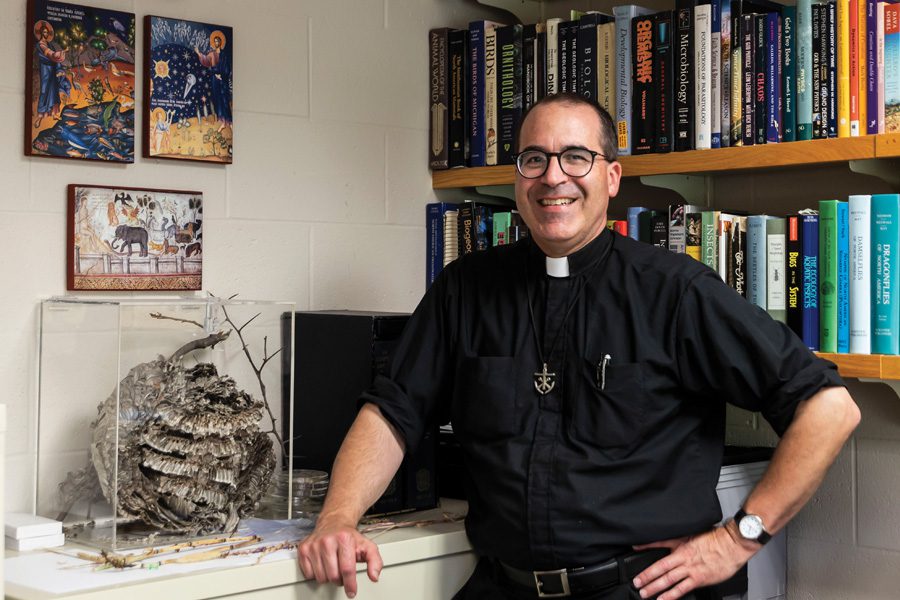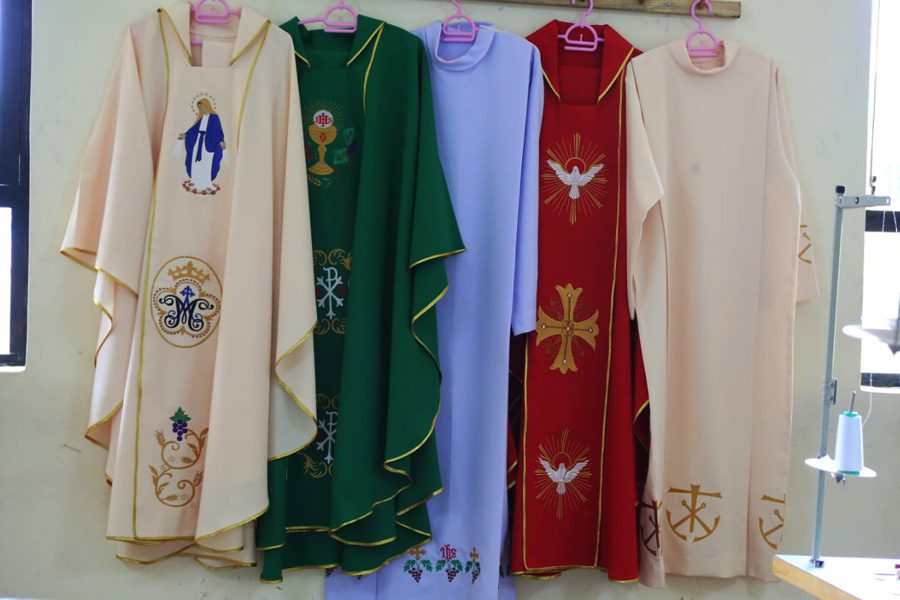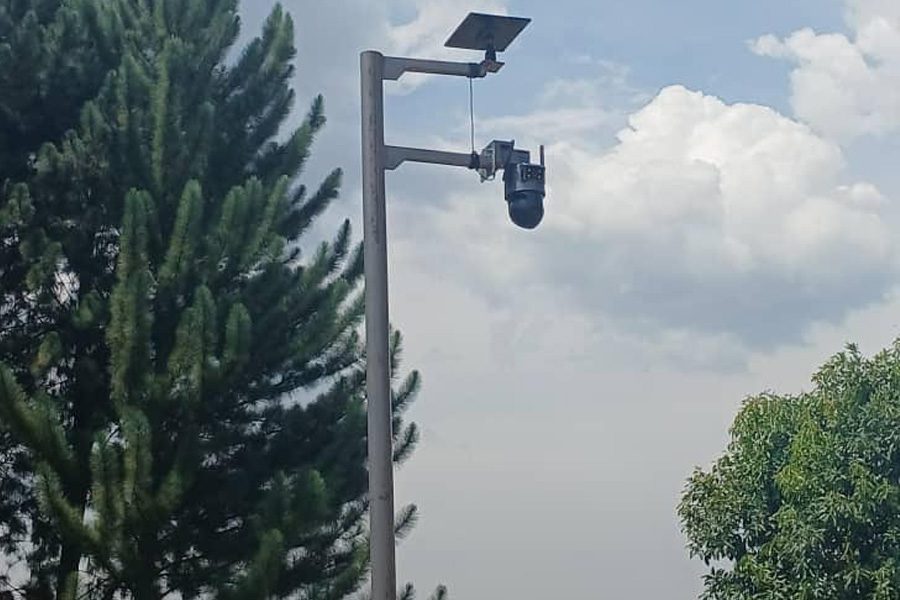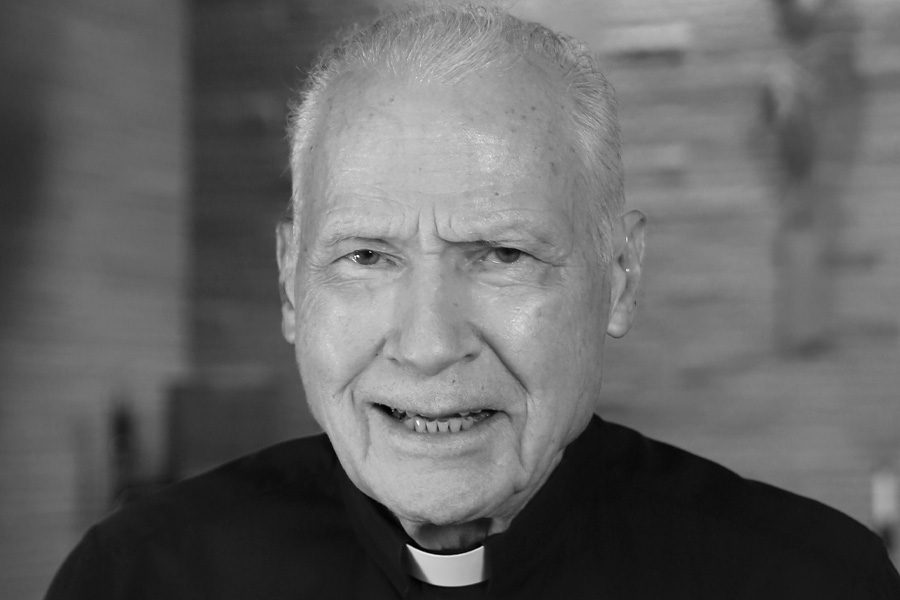If Rev. Terrence P. Ehrman, C.S.C., had a business card, it would simply state “Missionary of God’s Wonder.” That is who he is and what he does.
A great love of creation pulled Fr. Ehrman to pursue a career in the sciences, specifically as a biology professor. During graduate school, he studied entomology with plans to name a new species of caddisflies in the tropics. After the first year, Fr. Ehrman left this work to become a theologian. He appreciated the study of biology but found fulfillment with intellectual questions done at the philosophical and theological level.
“Instead of being a biologist who thinks about God, I’m a theologian who thinks about plants, water, and insects,” noted Fr. Ehrman. He has a B.S. in biology from the University of Notre Dame, an M.S. in aquatic ecology from Virginia Tech, an M.Div. from Notre Dame, and a Ph.D. in systematic theology from The Catholic University of America.
Upon returning to Notre Dame, Fr. Ehrman began a visiting professorship with the McGrath Institute for Church Life. He was instructed to design and teach a class of choice in the theology department. This charge was the beginning of the Science, Theology, and Creation class at Notre Dame.
Class Experience
“It’s a look at who God is as creator, how God acts in the world, and what creation is. Then we look at that in four different chronological aspects: scripture, tradition, early church, and medieval. That would be the first eight weeks of class. Then, after the break, we apply that to three contemporary areas: cosmology, evolution, and ecology, with evolution being the longest component of those three,” shared Fr. Ehrman. “I knew that if my students were going to study creation, they should be out in it. So, I developed lab components for my class for these outdoor experiences.
By the end of the course, students can explain creation as a theological and philosophical term, understand how the Father, Son, and Holy Spirit all work together in creation, analyze scientific debates from a theological perspective, and recognize our role as creatures of God.
According to Fr. Ehrman, a popular class initiative is the Tree Project. Students identify a place on campus with a tree, visit it weekly for 10 or 11 weeks (depending on semester), and spend 10-15 minutes in observation. Participants are required to submit a weekly theological journal/scientific notebook with the date, area conditions, location of the sun, and observations heard or smelled. They are also invited to give insights that reflect on a perspective that could be scientific, objective, human, priestly, etc.
“In the beginning, most students think this is hokey. By week three or four, they really get a sense that this is not what they thought it was going to be, and there’s something more to this. The project’s really about teaching them about attentiveness, either A) to themselves, to a tree, or to God if they’re open to that, and B) how do you see the world, or how do you not see the world?” noted Fr. Ehrman.
Through this project, students can begin to understand the immanence of God; a person can see the tree, touch the tree, study the tree, and climb the tree.
Student Impact
During his time teaching, Fr. Ehrman has encountered students who claim to be atheists but come to the recognition that they cannot be atheists in the same way they were at the start of class; their view of God changes from rejecting God to seeing faith in a different way.
“I’ve had one student who got baptized,” recalled Fr. Ehrman. The male student had been dating a Catholic woman. “He was a searcher and thinker, but the thing that finally changed things for him was this class and this certain theological concept we were talking about. He entered RCIA and was baptized.”
Taking insight from “The Hexaemeron” by Saint Basil the Great, this is an opportunity to inspire students about creation, that even the simplest flower or plant brings a clear remembrance of the creator. The course offers a guided tour of the amphitheater of creation.
“What I’m doing in the class and the lecture part is giving them the theological and philosophical background that’s guiding them in how to think. What does creation mean? Well, creation is the relationship of dependence for God for existence, so that nothing would exist without God. Creation is not something that just happened in the past, 13.7 billion years ago with the Big Bang. God is creating as much now as he did back then. And so, God is giving being to something. That’s what creation is,” said Fr. Ehrman.
The course has been available each year since 2015, and continues to inspire students.
“I think fundamentally, it’s all about how do they become people of faith? God is always aware of us. We are not always aware of Him. And so, how do they become more aware of who God is and give their lives to Him? It’s all in this guided tour of the amphitheater of creation, a proclamation of the kingdom. And also, that God is not confined to a church,” said Fr. Ehrman.
Published November 2025




